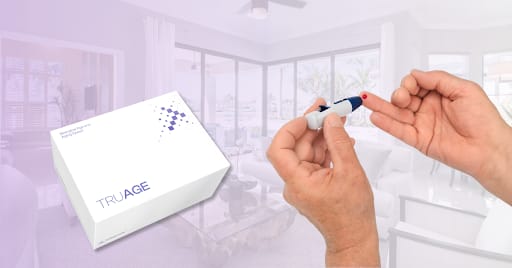Good afternoon 👋
Here we are at the end of another month! It’s the perfect time to assess your health goals, decide any new ones for the new month, and adjust your habits accordingly!
In today’s email we cover muscle strength & cardiovascular disease risk, walking off belly fat, and eating your vitamins.
At 10almonds, we recently reviewed a book about the importance of data-driven health, today’s sponsor TruDiagnostic is offering just that: its groundbreaking TrueAge & TruHealth plan includes an at-home blood test that gives a wealth of data including 185 key biomarkers, as well as 900,000 epigenetic sites, before crunching the numbers to give you personalized health recommendations. Check it out!
Today’s Main Feature
How Strong Is Your Heart?
There’s a correlation between your genetically predisposed muscle strength, and your cardiovascular disease mortality risk:
Recommended Reading
This Bill Aims To Help Firefighters With Cancer. Getting It Passed Is Just the Beginning.
Here’s why:
How To Be 7.5x More Likely To Develop Chronic Fatigue Syndrome
Or conversely, if you’d rather not do that, then there’s this one thing you really want to avoid:
Watch and Learn
Can Walking Really Burn Belly Fat? What Science Says
Visceral belly fat is harmful and increases risks of heart disease, diabetes, and metabolic issues in general. Can walking get rid of it, or are more extreme measures needed? Science does have the answer:
Prefer text? The above video will take you to a 10almonds page with a text overview, as well as the video!
Our Sponsors Make This Publication Possible
Your Personalized Blueprint for Health Starting at $499
What if a single test could unlock everything you need to know about your health? With TruAge, it can.
From identifying your biological age to tracking key markers like inflammation, vitamins, and metabolic health, their reports are fully customized to you.
You’ll receive actionable steps based on your results, giving you the clarity and confidence to make impactful changes. One finger prick of blood, one life-changing report.
10almonds readers can save 20% today with code WELLNESS20:
Please do visit our sponsors—they help keep 10almonds free
This Or That?
Vote on Which is Healthier
Yesterday we asked you to choose between dandelion greens and red lettuce—it wasn’t close, and we picked the dandelion greens (click here to read about why), as did 81% of you!
Now for today’s choice:
Click on whichever you think is better for you!
Bonus (Sponsored) Recommendation
One-Minute Book Review
Eat Your Vitamins: Your Guide to Using Natural Foods to Get the Vitamins, Minerals, and Nutrients Your Body Needs – by Mascha Davis, RDN
This book methodically discusses an assortment of vitamins, minerals, and other nutrients; the “other nutrients” category including amino acids (branched chain and essential), prebiotics and probiotics, and triglycerides of various kinds.
It makes the argument that we are better off getting these things from nature than from supplements, and in the category of criticism, it doesn’t make that argument very well. The truth is that yes, bioavailability of many nutrients is higher from food, the author is a little selective in problem recognition—for example, criticizing supplements as sometimes being contaminated with heavy metals, right after recommending fish (famously a rich source of heavy metals, along with actual nutrients).
In a similar vein, she does not pay a lot of attention to downsides of certain foods, so for example we will see her recommending beef as a source of many nutrients—which it is! It’s just also a top risk factor for heart disease, cancer, diabetes, and more. But, the author is a registered dietician-nutritionist and not a cardiologist, oncologist, epidemiologist, etc, and it shows.
On the other hand, a strength of this book is that it does elucidate what the various nutrients are and what they actually do, which conveys a level of understanding that very many people don’t otherwise have (your average person in the street is unlikely to be able to say what vitamin B3 actually does, for example).
The style is straightforward and clear, making this book an easy quick reference source, as well as being readable cover-to-cover if you so desire.
Bottom line: if you’d like to know more about the nutrients we humans need, this is a great book! Just watch out for the downsides of some foods though, as the author can be a bit overly generous in her recommendations.
Penny For Your Thoughts?
What did you think of today's newsletter?
Wishing you a wonderful Wednesday full of wellness,
The 10almonds Team









